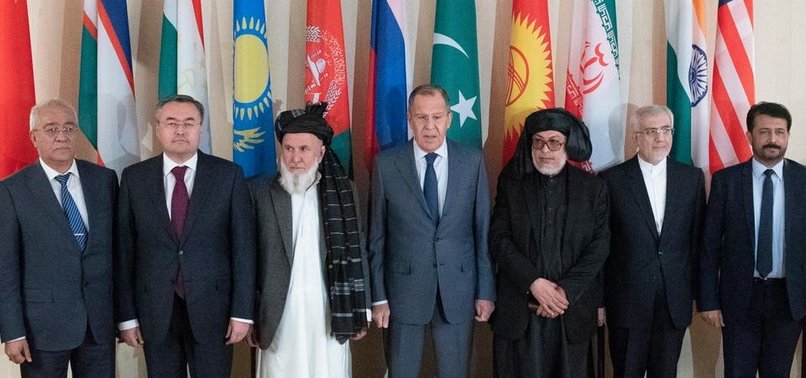Moscow conference on Afghanistan rejects return to “Islamic Emirate” in the country
The conference is taking place in Moscow to kickstart talks between the Afghan government and the Taliban in Doha which had stalled since their resumption in September last year.

By IAR Desk
In a big win for the Afghan people the Moscow conference of the extended troika – Russia, China, USA, and Pakistan – on a peaceful settlement in Afghanistan have rejected a return of the “Islamic Emirate” system in Afghanistan.
In a joint statement released at the end of the deliberations representatives of Russia, China, USA, and Pakistan said “As stated in the UNSC resolution 2513 (2020), we do not support the restoration of the Islamic Emirate and we call on the government of the Islamic and the High Council for National Reconciliation to engage openly with their Taliban counterparts regarding a negotiated settlement,” the statement said.
The conference is taking place in Moscow to kickstart talks between the Afghan government and the Taliban in Doha which had stalled since their resumption in September last year.
Also read: Asian human rights defenders call for immediate end to targetting killings in Afghanistan
The talks in Doha were a result of the peace accords signed between the USA and the Taliban on February 20 last year in Doha, Qatar, towards a lasting peace in Afghanistan. The USA is also committed to removing all its troops from Afghanistan by May, but which the new administration of Joe Biden says will be difficult to meet.
Russia, which has good relations with the Taliban, have hosted intra-Afghan talks earlier as well as in the “Troika” or “Moscow format” – including Russia, China and Pakistan.
The Afghan government is being represented by Dr. Abdullah Abdullah, Head of the High Council for Reconciliation, and the Taliban is being represented by Mullah Abdul Ghani Baradar. US peace negotiator Dr. Zalmay Khalilzad was also a participant. Qatar and Turkey were present in their capacity as “guests of honor”.
Also read: Afghanistan conference draws donor pledges and calls for lasting ceasefire
While Russia has major concerns in Afghanistan – to thwart the rise of ISIS in the country and in neighbouring Central Asian states, which are it’s near abroad, and also to combat the drug trade emanating out of Afghanistan and passing through Russia – the conference also signals that Russia wants to remain a major stakeholder in the region.
The joint statement released in Moscow called on participants in the intra-Afghan negotiations to engage immediately in discussions on fundamental issues to resolve the conflict.
The statement called on the Afghan government and the Taliban to ensure that terrorist groups and individuals do not use Afghan soil to threaten the security of any other nation.
In the statement, the delegates also reaffirmed their commitment to the protection of the rights of all Afghans, including women, men, children, victims of war, and minorities.
Also read: India can play a Vital Role in Establishing Lasting Peace in Afghanistan: Dr. Abdullah Abdullah
“We call on all parties to the conflict in Afghanistan to reduce the level of violence in the country and on the Taliban to not to pursue a spring offensive, so as to avoid further casualties and to create an environment conducive to reaching a negotiated settlement,” according to the settlement.
The statement also called on the global community to contribute to building lasting peace in the country.
“We recognize and welcome all international efforts that are underway to facilitate and support a negotiated settlement as soon as possible,” said the statement.
Also read: Ghani Urges World To Support Peace In Afghanistan In Speech To UN
Even as talks have stalled violence has been spiking in the war torn country.
In the latest attacks, four civilians were killed and 14 more were wounded after a bus carrying government employees was targeted by a blast in Kabul on Thursday morning.
According to data collected by TOLOnews 144 people have been killed and 214 others have been wounded in different security incidents in the last 18 days. The country is bracing to face the Taliban’s “spring offensive” as the organisation has not committed to a ceasefire, which it says is to be a part of the negotiations. At the same time, it has refrained from targetting any US troops inside the country.
Separately, Turkey will be convening a conference under the UN aegis on Afghanistan which will include all regional stakeholders, including India.
Of special significance to India will be the clause of the Moscow statement which calls on both the Afghan government and the Taliban to ensure that terrorist groups and individuals do not use Afghan soil to threaten the security of any other nation.